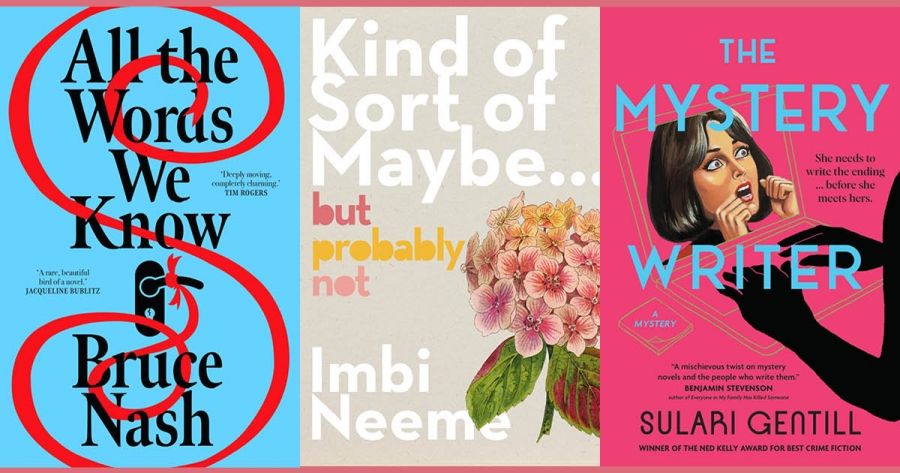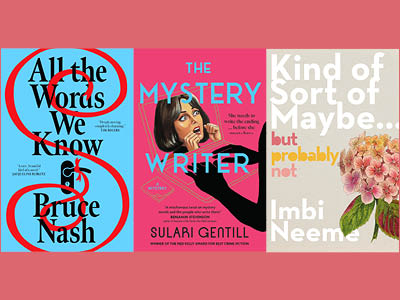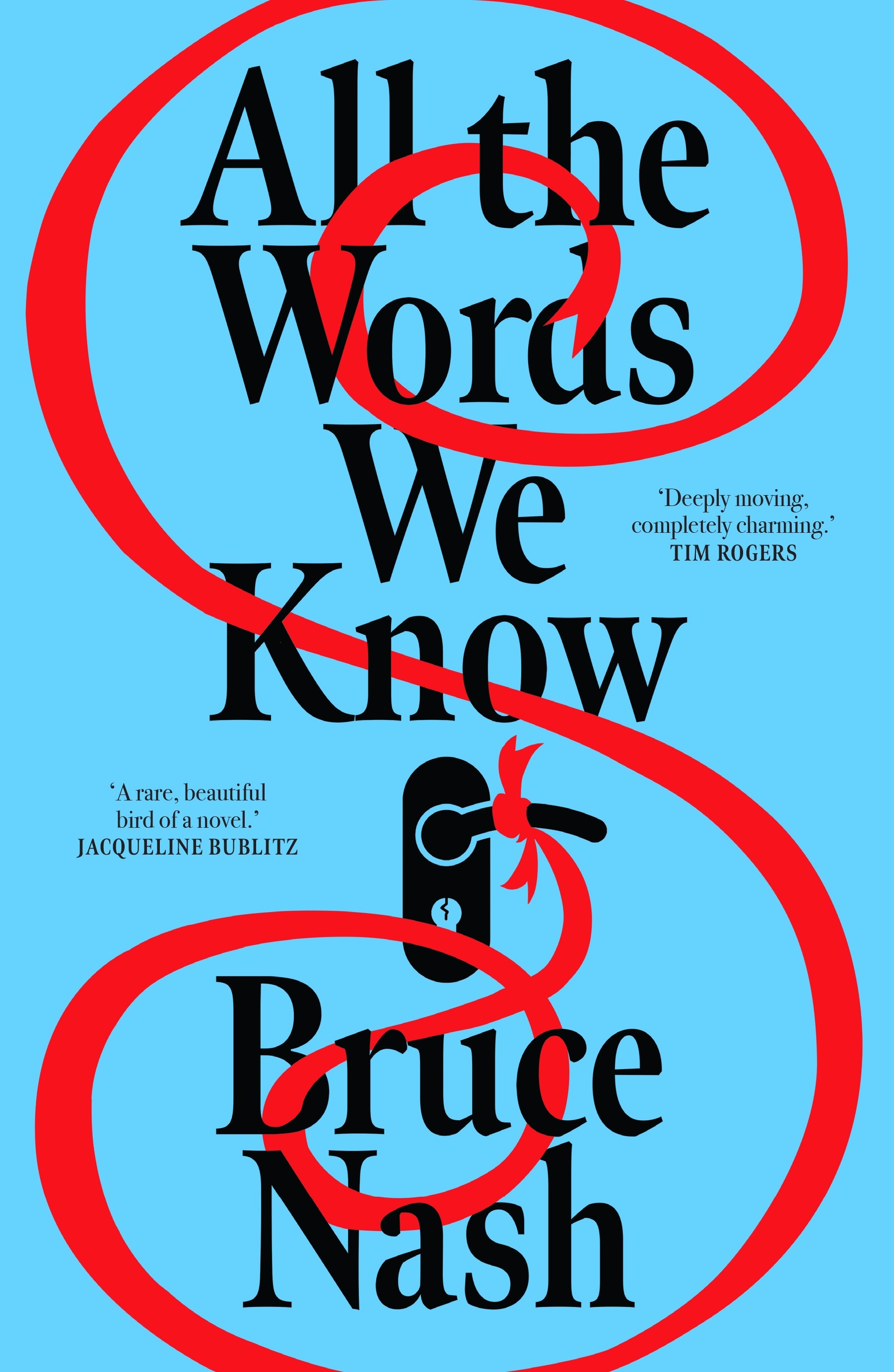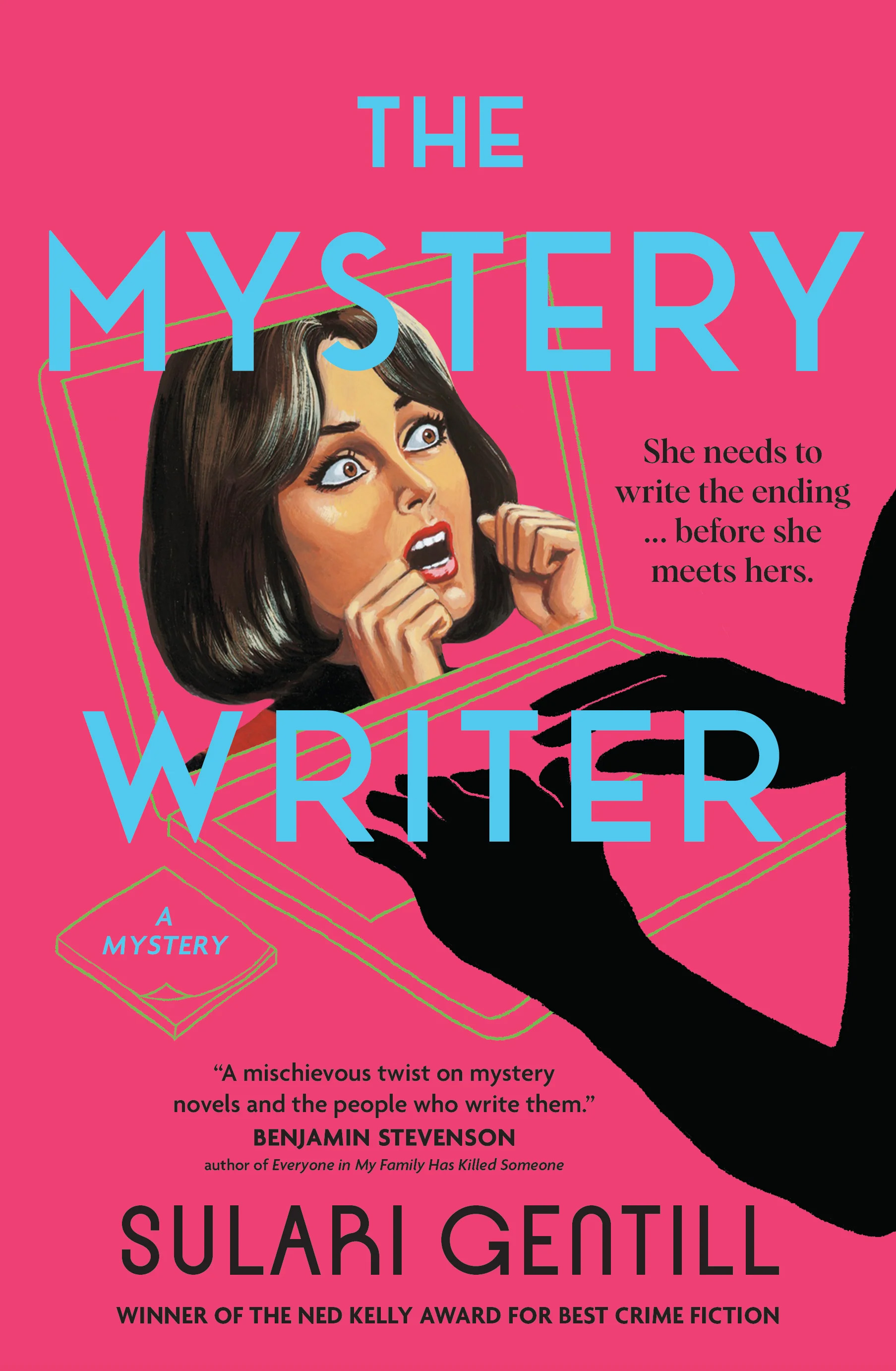
- Free Article: No
- Contents Category: Fiction
- Custom Article Title: Alex Cothren reviews three books
- Review Article: Yes
- Article Title: Cognitive discotheque
- Article Subtitle: Escape from real-world insanity
- Online Only: No
- Custom Highlight Text:
Lately, my bus route home has been taking me past a motley protest. Come rain or shine, a handful of ragged individuals can be found marching up and down a traffic median strip near Flinders Medical Centre, wearing sandwich boards and hoisting neon placards with phrases like STOP VACCINE GENOCIDE or W.H.O. CHILD DEFILEMENT, etc. Contrails feature somewhere in the mix, too, but the bus always zips by before I can parse the finer details.
- Featured Image (400px * 250px):

- Alt Tag (Featured Image): Alex Cothren reviews ‘Kind of, Sort of, Maybe, But Probably Not’ by Imbi Neeme, ‘All the Words We Know’ by Bruce Nash, and ‘The Mystery Writer’ by Sulari Gentill
- Book 1 Title: Kind of, Sort of, Maybe, But Probably Not
- Book 1 Biblio: Viking, $34.99 pb, 317 pp
- Book 1 Cover Small (400 x 600):

- Book 1 Cover (800 x 1200):

- Book 2 Title: All the Words We Know
- Book 2 Biblio: Allen & Unwin, $32.99 pb, 321 pp
- Book 2 Cover Small (400 x 600):

- Book 2 Cover (800 x 1200):

- Book 3 Title: The Mystery Writer
- Book 3 Subtitle: A novel
- Book 3 Biblio: Ultimo Press, $34.99 pb, 304 pp
- Book 3 Cover Small (400 x 600):

- Book 3 Cover (800 x 1200):

The protagonist of Imbi Neeme’s second novel, Kind of, Sort of, Maybe, But Probably Not (Viking, $34.99 pb, 317 pp), is just as isolated and misunderstood as my protester friends. Here, the reason for this anti-sociality is genuine. Phoebe Cotton suffers from misophonia, a neurological disorder marked by a decreased tolerance for specific sounds. An early scene drops us right into the pain of inhabiting this ‘brain … like a mixing desk where some of the controls were a little bit broken’, with colleagues’ apple crunching and tea slurping driving Phoebe into a ‘red mist’. While close to her understanding parents – who mask their mastication at mealtime by blasting Handel’s Hallelujah Chorus – Phoebe otherwise lives a ‘loveless, friendless, impermanent life’. She works at the library, then returns to her grandmother’s former home in Footscray, guiltily ignoring the dying garden in favour of reading old Regency romance novels. This sad equilibrium is disturbed when mysterious postcards hinting at a hidden love affair start arriving in the mail. To find their true recipient, Phoebe is pushed beyond her comfort zone and forced to expose her own secrets in the name of friendship and love.
That the central intrigue of the postcards is slowly and skilfully doled out will be no surprise to those familiar with the drip-fed revelations of Neeme’s Penguin Literary Prize-winning début, Swell (2018). But that novel also had an unfortunate tendency to force clunky epiphanies from its characters’ mouths, a trait that persists here. At one point, Phoebe comes to an understanding that ‘people were like sandwiches – everyone could see the bread, the outer layer, but the stuff in between wasn’t always visible’. I suppose that is biologically spot-on, but as an abstract concept it is undermined by how open and instantly ready to talk about their feelings everyone is here. There is a running gag that Phoebe’s quirky parents are straight out of Family Ties, and indeed the whole book feels like a 1980s sitcom. It is earnest, well-meaning, and careful to iron out every wrinkle of conflict with a heartfelt monologue. And while it is comforting to imagine a book this sweet and cosy circulating through the literary bloodstream – a yang to the latest Jo Nesbø bloodbath yin – I have to agree with my protester friends this time: the world is not so simple.
A quick skim of Bruce Nash’s third novel, All the Words We Know (Allen & Unwin, $32.99 pb, 321 pp), might also place it in the ‘cosy mystery’ basket. In a word cloud of the text, ‘Tea’ and ‘Bingo’ would loom large, and its elderly protagonist, Rose, has a love of bad puns. Rose also has late-stage dementia, her insular retirement home life reduced to two vague activities: ‘Sometimes I wonder. Sometimes I wander.’ When her only friend falls to her death in suspicious circumstances, Rose must battle her own brain to reveal a scheme that exploits the most vulnerable.
In telling the entire story from Rose’s perspective, Nash commits to the linguistic challenge of representing a disease for which loss of language is a tragic feature. Rose’s grasp of words is greasy; they slide and collide into one another, producing wild, Lewis Carroll-like neologisms. ‘Elevator’ becomes ‘relevator’, ‘Individual Care Plan’ becomes ‘Invidious Scare Plan’ and (my personal favourite) ‘Cognitive Dissonance’ becomes ‘Cognitive Discotheque’. Time is equally unfettered. It stretches – ‘at night, in this place, you live forever’ – then snaps forward with a ferocity that leaves Rose, and the reader, unsure whether a new chapter is ‘the next day, or the next month or year or something’. Nash’s prose is as convincing as any I have encountered in fiction representing dementia, including the text that is often held up as the gold-standard of this endeavour: Lisa Genova’s Still Alice (2007).
In lesser hands, the noir mystery that propels the story forward might have felt like a cheap trick, making hay out of a protagonist who forgets vital clues moments after discovering them. But in peeling back the layers of managerial rot at Rose’s aged care home, Nash makes an astute point about how deficiencies in care cause more suffering than the disease itself. The end result is a rare beast: a page-turner that demands slow reading and ongoing contemplation.
Sulari Gentill’s sixteenth novel, The Mystery Writer: A novel(Ultimo Press, $34.99 pb, 304 pp), also tackles serious issues, one of which is the danger of online conspiracy theories. After quitting law school in Australia, Theo arrives on her brother’s doorstep in Kansas hoping to write a successful novel in three months. The first plot twist is that she does just that, bolstered by a chance meeting with bestselling author Dan Murdoch, who becomes her mentor and then her lover. After discovering Murdoch murdered in his home, Theo becomes both a suspect of investigation and a target for a fringe online community whose paranoia Murdoch appears to have been stoking.
Gentill, a past Ned Kelly Award winner, is ten books deep into her Rowland Sinclair series of detective novels set during World War II. She flexes her mystery-writing muscles here. From the startling first line – ‘He awoke early on the day he died’ – the plot moves at a rollercoaster pace, while also using the brake runs to delve with nuance into Theo’s experiences as victim of sexual assault. For this particular thrill ride, Gentill could not have picked a better theme park than the American Midwest. Theo has escaped a backwaters childhood in a Tasmanian cult but this is nothing compared to the dangers of a region where every third stranger owns a gun: ‘Knowing people might be armed was a little like knowing there had been a spider on the wall just a minute ago.’
Anton Chekhov’s constitutionally supported AR-15 does indeed go off in the story’s denouement, a hail of bullets leaving holes in the characters and only occasionally the plot. Gentill pulls the rug on us by first hinging the action on a fairly ho-hum conspiracy theory about world leaders being brought back from the dead, before topping it with a wild twist that plays on cancel culture and the cult of the writer. Those last hundred pages lifted off the tarmac of credibility for me, but enjoyably so, providing a cartoon vacation from real-world insanity. Then the book ended, and I was left looking out the bus window once more.


Comments powered by CComment